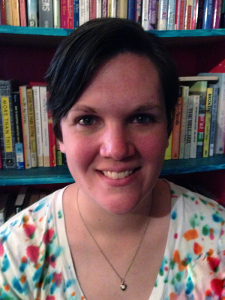Ruth F. Hunt's Blog, page 4
August 6, 2016
How can Hunt justify allowing people who need transplants to die?
Leukaemia sufferer KATHRYN CARTWRIGHT received fresh hope after receiving a second stem cell transplant – but now this procedure is being restricted. She tells the Star what this devastating decision will mean for patients, writes Ruth Hunt
Source: How can Hunt justify allowing people who need transplants to die?


July 20, 2016
Workshop: Writing about Disability and Disabled Characters.
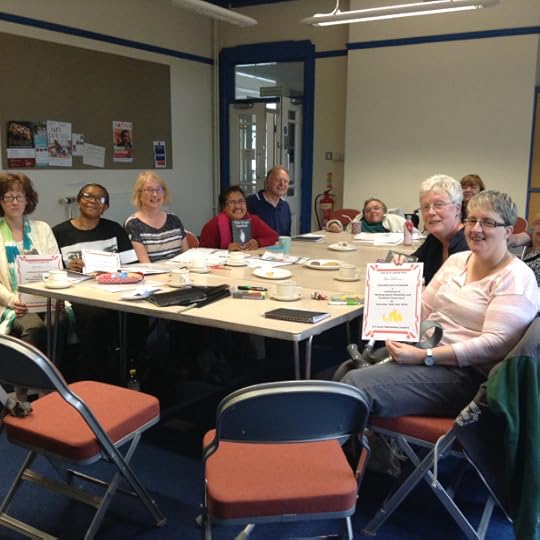
On July 16th I was in Bilston to visit a writing group and deliver a workshop on writing about disabled characters. Thirteen members turned up, and the room was packed. Rather than just me talking at the front we discussed as a group the models of disability, and how this could be used in writing about a character with a disability. We looked at areas that might affect someone with a disability – in a negative or positive way.
A – access
R – rights and responsibilities
E – employment and education
A – attitudes.
As there were some members of the group who were disabled, they were able to give real life examples of discrimination or negative comments they had experienced.
We also talked about why writers might feel nervous tackling such a subject, and I outlined some sources of help for a writer. Three writing exercises were given during the workshop, with lots of superb work.
I had packs for each member full of additional material and at the end of the workshop certificates were handed out.
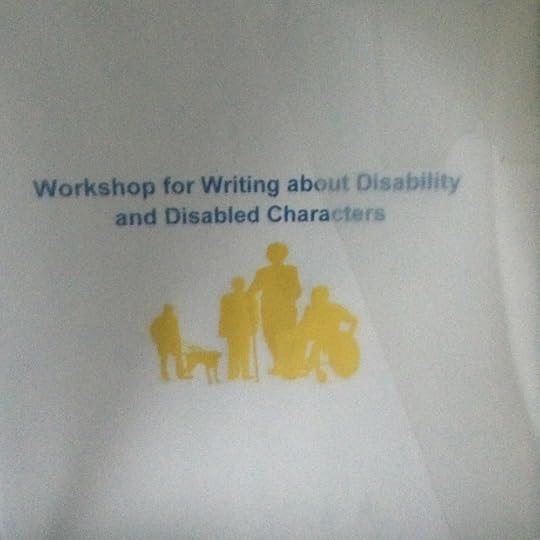
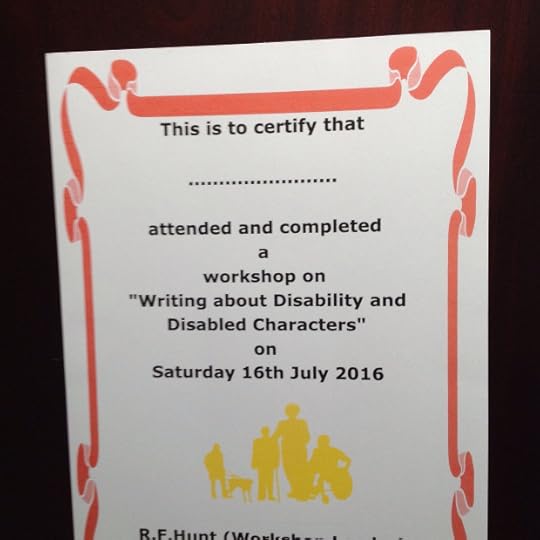
If you belong to a writing group and would be interested in this workshop, do get in touch.


July 9, 2016
Writing Workshop in Walsall
It’s with pleasure that on Saturday 16th July, I’m visiting a writing group in Walsall to deliver a workshop on using disability and disabled characters in their work.
This has long been in the diary and was an invitation from a fellow writer (and poet) who has read The Single Feather.
I’m preparing packs for those present, and if anyone has a special interest in writing about disabled characters I will be able to dispatch further copies, within reason. Ideally, however, this is a workshop to take part in, and in the spirit of the best groups, learn from each other.
 This is a sneak peek at one of the pages in the pack.
This is a sneak peek at one of the pages in the pack.


June 26, 2016
The Social Responsibilities of a Writer
I have had the experience of having two very separate lives. Up to the age of 18 I was a sporty, able-bodied teenager looking forward to university, and my future in general. The second life began …
Source: The Social Responsibilities of a Writer


June 11, 2016
Women’s Pensions
This is the first part of my article with Trudy Baddams in The Morning Star.
Women born in the ’50s, who’ve paid their taxes and national insurance for decades, have now been left high and dry by changes to their pensions. Ruth Hunt talks to TRUDY BADDAMS – one of the activists who is doggedly fighting back
Source: Women’s Pensions


June 2, 2016
Interview for GFT Press with Artist, Writer, and TwitterArt founder – David Sandum
I interviewed renowned artist, award-winning author and charity founder, David Sandum for GFT Literary Press. Take a look here:
http://www.gftpress.com/davidsandum


May 29, 2016
Why I Won’t be Watching Me Before You.
This is a one-off blog post about the book and film Me Before You, and why as someone with spinal cord injuries I find it offensive.
Me Before You? Isn’t that the universally adored novel by JoJo Moyes so many people find ‘truly inspirational’? Doesn’t it feature a disabled person, something you’ve been banging on about for at least two years?
Like many in the disabled community I do find it offensive, and the bit about the book being adored by lots of readers is true, but do check out the Amazon reviews that are three stars and less and you’ll find plenty of objections to the novel. It does feature a disabled man, but I don’t think it helps in the slightest, and instead sends out an irresponsible and sadly predictable message regarding disability and how someone copes after a ‘life-changing’ accident.
Spoiler alert: ‘Will’ is quadriplegic after an accident, but is depressed and wants to go to Switzerland to end his life. His mother asks him for six more months, and appoints ‘Lou’ to basically suicide watch ‘Will’, though at this stage ‘Lou’ doesn’t know that. ‘Lou’ is recovering from a trauma, has lost her confidence and not reached her potential. Through caring for ‘Will’ she improves her confidence, but he still opts for euthanasia. One of the reasons being he doesn’t want to ‘hold her back’. As he is wealthy, he leaves a sizeable amount of income to Lou after his death in Switzerland.
I don’t think the book is really about ‘Will’. Instead he is there to facilitate the change in the mindset of Lou as she has lost her confidence due to past trauma.
Disabled people don’t exist to make carers feel good about themselves. We don’t decide (generally) to set someone free by suicide or euthanasia, so they can ‘live boldly’ as we are such a burden and are holding them back in life (!).
“I’ve watched you these six months become a different person, someone who is only just beginning to see her possibilities. You have no idea of how happy that has made me .I don’t want you to be tied to me, to my hospital appointments, to the restrictions on my life. I don’t want you to miss out on all the things someone could give you.” (p426)
“There are a host of conditions encroaching on me. I can feel it. I don’t want to be in pain, or trapped in this thing, or dependent on anyone, or afraid…” (P.428)
Now I’m not saying living with such a disability is easy, but if I had read this book when first injured, when I was lying in my hospital bed, unsure of whether I would ever walk again, unsure of whether I would ever work or have relationships in the future, then this book would’ve made me depressed. I worry that newly disabled people will read this book/ see this film and assume from it they are a burden, that they will think they won’t be ever capable of having a decent quality of life.
I think it is a missed opportunity to show that life after injury is possible. Yes, it’s a different life, but many people with spinal cord injuries go on to live very complete lives. They are workers, fathers, mothers, lovers and can, if society lets them, be full members of a community.
Also, very few people, if any at all, have the level of wealth ‘Will’ does, so our death (by whatever means)doesn’t result in a tidy pay-out to a care giver – instead it usually results in costs to those left behind, due to the financial insecurity many disabled people face
His (‘Will’) wealth is an interesting point, because it allows the author to side-step any of the real issues that disabled people face, from having their benefits cut to not being able to get a job. Or not being able to take up a place at university (due to poor access) or because or poorly delivered segregated ‘special’ schooling.
‘Will’, for example, didn’t have to wait two years for a modification to his bath, as the Occupational Therapists are over stretched. Indeed, his wealth means the author can address his disability purely from an outdated medical view of disability – that it is his injuries that are disabling. This is rather than the social model, which means it is factors in society, like my bath modification not being fixed, that actually cause disability. The social model means if society was really geared up for disability, then disabled people would have a chance to flourish, on a level playing field, just like anyone else. Sadly, we are still some way off society being set up for disability, and although there are hints of this in the novel, due to his wealth it’s never fully explored, which is another missed opportunity.
‘Lou ‘uses a spinal injuries forum to get advice and information, and at one point is asking for advice on what activities she can do with ‘Will’. Though instead of calling him ‘Will’ or ‘my friend’ or even ‘the person I am looking after’ she refers to him as a ‘quad’.
Now I’ve been on lots of these forums and I’ve never seen this, referring to someone by the (shortened) name of their disability, rather than by name. Again this is a very medical model approach – focusing on the disability and not the person. She also at one stage talks about ‘Will’ not wanting to live. The author makes another curious decision here. She decides to print in full the ‘response’ from a person (Gforce) with quadriplegic:
“Can you really put yourself in his shoes? Do you know how it feels to never be able to empty your bowels without help? To know that forever you are going to be stuck in your bed/unable to eat., dress, communicate with the outside world without someone to help you?” P.270
‘Lou’ apparently gets messages on the forum from “other quadriplegics criticising Gforce for his bleak words, protesting that they had found a way forward , that theirs was a life worth living” (P271) but instead of writing these responses in full, like she did with ‘Gforce’ it’s just expressed as an aside. Again, through these choices, the author is reinforcing the ‘I am a burden – medical model’ theme of the book.
Me Before You is described as a romance, but where is the sex? I’ve never known Hollywood to hold back on sexual scenes, but we can’t blame them, because this was a decision made by the author. She decides to make it a ‘love story’ between ‘Will’ and ‘Lou’, but actually ‘Lou ‘has a able bodied boyfriend, to satisfy her needs.
People with spinal cord injuries are capable of sex. We are capable of becoming fathers and mothers. We don’t suddenly lose our sex drives just because our spine is damaged. Why the author made this decision I don’t know, because it would’ve challenged this misconception held by a lot of the general public. However, she avoids this and as such it’s yet another missed opportunity.
Perhaps, even more concerning is the different first person POV chapters. We hear from everyone, bar ‘Will’ – questions must surely be asked about that. Maybe she was trying to stress his lack of control, but what it comes across as, is a sanitised view of disability, cleansed and made palatable for her audience.
So you might think all this is unimportant, it’s just a book – but it isn’t just a book anymore it’s a major mainstream film, and to add further insult to injury they have an able-bodied actor playing ‘Will’. We don’t accept ‘blacking up’ anymore so why are we not using the many disabled actors out there? From this interview with director Thea Sharrock in The Guardian, it doesn’t sound to me, as if it was seriously looked into:
‘Claflin was given the lead role after a number of actors were considered. We spoke to a few but there were limited options, with due respect to those we saw…To be honest, it was always a question of finding someone who would meet what the studio was going to require as well as what we needed.’ Vanessa Thorpe, Arts and media correspondent, The Guardian, 22nd May 2016.
So, not only are disabled actors not getting these parts, in a time period where disabled people are often accused of ‘faking’ the extent of their injuries, we have an actor ‘pretending’ to be disabled, who one minute is in the wheelchair, the next he is striding up the red carpet.
It would have been good to get the views of Sam Claflin who plays ‘Will’, so naturally disabled people took part in #AskSam on Twitter, where he refused to answer any of their questions. Likewise JoJo Moyes only responds to positive comments about the book and/or film. Maybe in the coming months she will try to argue that she’s encouraged a debate, it’s just a pity she decided to make it so one-sided, and not in support of disabled people.
The Single Feather (Pilrig Press) is a novel where the protagonist is definitely ‘Rachel’, who is paraplegic. It doesn’t end with Rachel killing herself or opting for euthanasia, but something truly radical, instead. You could argue (quite correctly) that it was written in reaction to novels like Me Before You. However, as a disabled writer, who hasn’t written the traditional ‘misery novel’ about disability – is anyone hearing my voice?
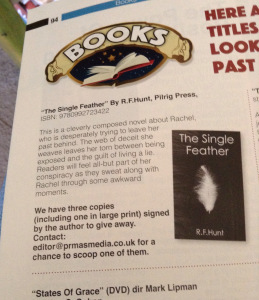
The Single Feather is reviewed in Able Magazine.
The page numbers refer to the p[aperback edition of the book, which for obvious reasons I won’t be linking here.


May 16, 2016
Allison Renner – How I feel about books for those, and written by those with a disability
You have a MLS degree from Texas Woman’s University School of Library and Information Studies and have a desire to specialise in delivering Library services for children with disabilities. Can you tell me more about this and the We Are Storytellers program?
I graduate with my master’s degree in library science in August; this summer I am completing the last step by doing an internship in my city’s library. They are allowing me to start a book club for adults with disabilities, and I’m so excited! I’ve previously volunteered and worked in a learning center for adults with disabilities, so I’m familiar with a certain group, but this book club will be open to the city’s population of adults with disabilities at large; I’m glad I’ll have a large audience for this because I think it’s necessary.
Library services for people with disabilities, period, are pretty lacking in this area; there is a sign language storytime sponsored by an outside organization, but the library doesn’t offer much. I am eager to start more programming like the previously mentioned book club, sensory storytimes, and more inclusive activities.
The We Are Storytellers program is something I started a few years ago as a volunteer at the learning center. I worked one on one with adults with disabilities to help them tell a story. If they could write and draw, they did it all, but if they needed help with the words, I would transcribe as they drew the illustrations and told the story to me. I was open to any type of story, but interestingly, each person told a fictional story, instead of one about themselves or their disability. I thought that shows a lot at how outsiders place so much importance on a disability, but the people who actually live with it don’t give it a second thought. We Are Storytellers was a great experience and I’m eager to start it up again as soon as possible.
2) I’m very impressed with your strong and enthusiastic social media presence with blog, podcasts and even YouTube videos. Can you give me the links of where we can find you, and tell me how this started out?
I’ve had a personal online journal since 2000 or so, sometimes public and sometimes private, so I’ve been familiar with blogging for quite awhile. I had to start a book review blog for a children’s literature class at school, so I went ahead and registered a domain name because I knew this is something I wanted to work hard on—for professional AND personal reasons. A few months in, I started an Instagram account with the blog’s name because I loved taking my own pictures of the books I reviewed on my blog. I was so happy to find that there’s an entire Instagram community that loves taking pictures of and talking about books, and they call themselves “bookstagram”. After I had that account for awhile, I noticed that some people would link to YouTube videos of them talking about books, so I watched a few and decided to try and create my own. There’s a whole community for that too, called “booktube”. I love making quick video reviews of books, but I found that I don’t LOVE being in front of the camera. I’ve subscribed to various podcasts for years now, so I decided to try my hand at that, too. It’s so much fun to have all of these outlets available to us via the internet, so I like trying them out to see what works best for me.
Blog: http://www.howifeelaboutbooks.com
Instagram: https://www.instagram.com/howifeelaboutbooks/
Facebook: https://www.facebook.com/howifeelaboutbooks/
Twitter: https://twitter.com/hifabooks
YouTube: https://www.youtube.com/channel/UCD56dpQDUXE_GcVPeHUTjdg
Podcast (via iTunes): https://itunes.apple.com/us/podcast/how-i-feel-about-books/id1084125483
Podcast (via Podbean): http://howifeelaboutbooks.podbean.com
3) You are passionate about books with disabled characters/protagonists, and those books written by disabled authors. Why is this important for you? Do you think representation of disability is getting better?
I think books that have characters with disabilities help the public learn more about disabilities. It’s sad to say, but a lot of society is still ignorant about disabilities, and judgmental towards those people. I feel like not many people would research disabilities on their own, but if those characters are in fiction books, people will read these books and learn about disabilities without realizing they’re learning. I especially love books where the main character has a disability, and the story is told in first person, so the reader can really get inside their head and “feel” what it’s like to have a disability. I think that type of book impacts people the most and helps change their mindset. It’s important to me because I think people need to be more accepting. There was a push in this country to let gays marry, and now transgender issues are getting all of the attention; meanwhile, people with disabilities are still fighting for their civil rights. I think it’s an important issue to bring to the forefront.
I just read a graphic memoir about a girl who realizes she’s a lesbian when she’s fifteen, and the author said this in an interview:
“I’m really excited for the day when you can no longer presume that the protagonist is straight, or that they’re white, or that they have all their arms and legs. There’s this unwritten rule that the protagonist has to be a tabula rasa for you to be able to relate to them, and that a tabula rasa equals straight, equals white, and just that — it needs to, and everyone wants to be able to relate to other kinds of protagonists and other kinds of stories.” (link to article: http://www.mtv.com/news/2262523/maggie-thrash-interview/) I love how she stated things, and I think THAT is what needs to change in fiction—don’t assume every protagonist is X, Y, and Z. Go in not thinking about WHAT the person is and HOW you can label them, just realize they are a person.
4) Books written by disabled authors continue to be fairly rare, yet there is so much talent amongst the disabled community. How can we better support disabled writers on the road to publication?
I think it’s most important to judge books by their quality, regardless of who writes them. Unfortunately, that’s not the way most publishing companies work. They want big names for big sellers, or even celebrities who can’t write their own books. I think all we can do is show our support of writers who have disabilities; buy their books, read them, review them, recommend them, talk about them. That’s what I’m trying to do with my website and overall web presence.
My husband wants to start a publishing company that exclusively publishes books by people with disabilities. A portion of the sales would go to an organization of the author’s choice, related to that disability. I think it’s a great idea and I plan to help out with it as much as possible: editing the manuscripts, helping design the layout and covers, promoting it all over the internet and local scene… It might not make a huge impact, but it’s a start, and that’s all we can do. Hopefully, people like me and you and others can start a movement that raises awareness about people with disabilities and everything they’re actually able to do, and it will form a major support system (like your site!) that will help them reach their goals.


May 10, 2016
Thank you!
As many of you know I only got discharged from hospital recently. Before I was admitted I was halfway through producing a pack for the 1:1/Advice Panel for Writers at The Atkinson, in Southport, which took place yesterday (9th May). However, that still left half to finish, with approximately two weeks to go.
I invited fellow authors, both traditionally and self-published to offer tips and in some cases longer pieces. I was really delighted with the response, and want to thank all of you who contributed. It meant the pack wasn’t just me waffling on, but gave a true picture of publishing today.
In particular, I want to thank Russ Gascoigne for writing the introduction, Anthony Trevelyan for writing about traditional publishing, Sean Maguire, Laura (Mole) Chapman), and Rebecca Bradley for writing about self-publishing, and Isabel Costello who gave a really good tip, which graced the front cover. I also want to thank Trish Nicholson ( Writing Your Non-Fiction Book) who very kindly donated two books to the event, much to the delight of those who got a copy!
It was a great event, tiring but good fun, with lots of authors and authors-to-be. I don’t think I met anyone who I didn’t feel had the potential to go on and write or publish.
As I’m saying thank you, it is only right to say thank you to Sefton Council Library Service and Lesley for inviting me. Also, many thanks to those who were also on the panel, Catherine Wilcox (MMU, Author), Oli Munson (Literary Agent AM Heath), and Ra Page (Founder and Publisher at Comma Press).
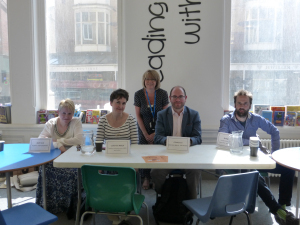
From left to Right
Me, Catherine Wilcox, Oli Munson, and Ra Page. along with Lesley from Sefton Library Service
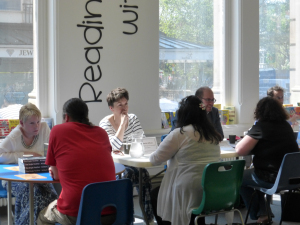
mid-session.


April 23, 2016
Want to get Published? The Writers Workshop Panel – The Atkinson
Source: Writers Workshop Panel – The Atkinson
It was a real honour to be asked to be part of this panel on May 9th in Southport. I hope we all can help those wanting to write, new to writing, as well as those who are more experienced or wanting to find out about courses.
If you live in the north-west this is a fabulous opportunity to chat to those working in the industry. It’s completely free to attend, and you will hopefully leave with inspiration and a desire to get writing.
The panel is:
Olly Munson Literary Agent at AM Heath
Ruth Hunt Local Author
Catherine Wilcox Creative Lecturer MMU and Authoor
Ra Page Comma Press
Come along for a 1:1 with any or all members of the panel, based at The Atkinson Library in central Southport close to major transport links.



